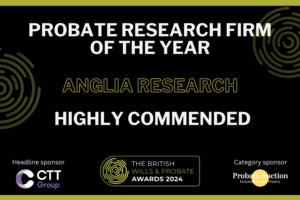To mitigate the risk of claims being made against them, personal representatives, solicitors and executors involved in distributing estates should commission bankruptcy and insolvency searches abroad as well as in the UK. However, there are also other areas of law where due diligence might include overseas searches. Commercial, planning and conveyancing lawyers should all consider international searches. In this article, we examine the legal basis for bankruptcy searches and the situations in which an international search is necessary.
Bankruptcy and Inheritance
Personal representatives, whether they are executors under a will or estate administrators in the case of an intestacy, must ensure that bankruptcy searches are conducted as part of the probate process. This is to ensure that estate funds can lawfully be issued to the beneficiaries.
As most people are aware, bankruptcy is a legal process which aims to provide relief to individuals who are unable to repay their debts, while ensuring that any assets the debtor may have are distributed fairly between creditors. However, bankruptcy does not immediately create a ‘clean slate’ and has legal effects that last for a period after the bankruptcy order is made.
The exact rules differ from country to country but in many territories, the responsibility falls on the personal representative to ensure that assets which rightly belong in the bankruptcy estate are declared and do not fall under the radar. Across the world, bankruptcy and insolvency is governed by various local laws and records are stored differently, meaning that locating information about individuals and companies that may be insolvent or bankrupt requires considerable expertise.
Probate lawyers and other personal representatives who neglect to commission comprehensive searches, including an international search, are risking professional and legal liability and failing to protect themselves.
Personal representatives – liability for maladministration
It is no secret that the role of personal representative carries a great burden of responsibility and legal liability. However, it is important to recognise that risks only tend to arise when individuals do not follow the proper processes. Being a personal representative for the deceased is also an incredibly rewarding and meaningful experience and people should not be ‘put off’ taking on the role by the element of responsibility.
At Anglia Research, we believe that complications and issues are unlikely when a personal representative is properly supported with legal advice and is educated about the necessary steps to take in order to avoid liability.
Personal representatives should be aware that, in England and Wales, they can be held personally financially liable for any loss to the estate resulting from a breach of their duties under section 25 of the Administration of Estates Act 1925. This means that they must reimburse any losses incurred from their own pocket. Section 1 of the Trustee Act 2000, which applies to personal representatives by virtue of section 35 of the same Act, prescribes a ‘duty of care’ and requires that the responsibilities are carried out with ‘such care and skill as is reasonable in the circumstances’.
Claims can be made against the personal representative by creditors and beneficiaries for maladministration of the estate, including wrongful distribution, and there is no upper limit on this liability. This is the case even if there has been a genuine mistake, so being unaware of the error or oversight will not usually be a sufficient defence.
To ward off potential maladministration claims, all personal representatives should carry out due diligence and commission suitably extensive bankruptcy searches.
Legal advisors – liability for professional negligence
Where a legal advisor such as a Solicitor, Legal Executive or Paralegal is assisting the personal representative with probate, they may wish to advise their client to commission bankruptcy searches internationally in addition to the standard national searches. Legal professionals should consider whether, bearing in mind the facts and their duty to protect the interests of their client, there could be scope for a future claim for professional negligence if they fail to advise their client on the necessity and use of bankruptcy searches.
Global bankruptcy regimes
Bankruptcy and insolvency rules differ around the world. Some countries have much longer periods in which assets can be seized, although there is an overall trend towards reducing the duration of the restrictions in order to be less punitive. For example in the Republic of Ireland, the Bankruptcy (Amendment) Act 2015 made several changes to bankruptcy, including reducing the normal duration from 3 years to 1 year. Under the original Bankruptcy Act 1988, the duration had been up to 12 years.
Under Canadian law, the duration of bankruptcy varies from 9 months to 3 years, depending on whether it is a first bankruptcy and whether the individual’s income is over a set threshold based on family size, in which case they must make ‘surplus income’ payments.
In contrast, European countries have predominantly implemented a repayment model of bankruptcy, in which repayments continue for a period of between 5 and 7 years before discharge from the remaining debt is possible. Other countries have strictly creditor-oriented bankruptcy regimes in which release from debts is not actually possible and repayments potentially continue until the entire sum owed is repaid. In this context, the risks around bankruptcy and inheritance are particularly high in territories with more punitive bankruptcy regimes which have long-term legal effects.
The situation in America is closer to the moderate regime we have in the UK. In the USA, bankruptcy is governed by the United States Bankruptcy Code, which dictates which assets make up the estate of the bankrupt and are thus subject to distribution to creditors. Section 541 of the Code contains the ‘180 day rule’, which stipulates that any inheritance which the bankrupt individual becomes entitled to within 180 days (6 months) of filing for bankruptcy will be included in the bankruptcy estate and must be reported and transferred to the Trustee.
Under United States law, Chapter 13 bankruptcies apply to individuals who have a regular income and are broadly equivalent to an IVA in the UK. These have slightly different provisions, in that cases are active for significantly longer and inheritance is taken into account and will affect repayments for the entire duration.
In 2019, there were 718,553 cases of personal bankruptcy filed in the USA, and statistics show that bankruptcy is becoming increasingly common for older Americans. Due to the ease and prevalence of bankruptcy, a search will be essential for American beneficiaries or where beneficiaries may have lived in the USA for any period of time.
Global movement: new lives abroad
It is clear that most countries have laws that limit the ability of bankrupts to directly inherit at least for a period of time. The need to search for bankruptcies abroad becomes even more important when you consider the number of individuals who make a temporary or permanent move abroad.
Many British people have relocated or retired to European countries such as Spain, Portugal, France and Malta, facilitated by the principle of ‘free movement of people’ between EU countries prior to Brexit. Other UK nationals are spread across the world, having started new lives in places such as America, Australia, the Caribbean and Canada. Families and individuals often move away leaving living relatives, from whom they will inherit upon death.
The risk that beneficiaries who live abroad may have been declared bankrupt in their country of residence or previous residence merits an overseas search. Without this due diligence, it is impossible to know whether the applicable time limit has lapsed, or whether the assets must be declared and transferred to the Trustee or local equivalent, to be distributed to creditors in repayment of debt.
The situation at home
Anglia Research also have significant expertise in conducting thorough searches within the UK, which can be more complex than expected due to devolution. In England and Wales, bankruptcy is governed by the Insolvency Act 1986. Under the Act, bankruptcy continues for a duration of 1 year from commencement, after which the bankrupt is usually discharged and is formally released from their bankruptcy debts.
After discharge, any inheritance which is left to the bankrupt may be kept in full. However, in the year that the bankruptcy is active, any windfall or inheritance must be paid to the Official Receiver or appointed Trustee in Bankruptcy to distribute to creditors in accordance with the rules on preferential debts.
The House of Commons has published a helpful briefing paper which explains how inheritance and bankruptcy laws interact in England and Wales and the Law Society has also published advice that confirms that personal representatives should rule out bankruptcy of all beneficiaries prior to estate distribution. Until a bankruptcy order has been discharged, any direct payment or transfer of assets to the beneficiary in question is considered incorrect distribution. If this happens, the Executor can be held personally liable for making the payment and can be sued by the Trustee for the amount in question.
Similarly, if a beneficiary has entered into an Individual Voluntary Arrangement (‘IVA’) in the UK for debt repayment and has not yet made the final payment and received their certificate of completion, their insolvency practitioner should normally be notified and the inheritance may be used to pay creditors. Often, the contract governing the arrangement will contain a ‘windfall clause’ which ensures that any unexpected payments such as inheritance are brought into the IVA to repay creditors.
In the case of an IVA, it may be possible for an estate administrator to release funds directly to the beneficiary, who will then take responsibility for discussing and resolving the matter with their insolvency practitioner. However, beneficiaries who are subject to an IVA are at risk of being declared bankrupt if they fail to make repayments under the arrangement, so a final check is crucial before any funds are transferred.
It is also worth noting that Scotland has its own bankruptcy law, the Bankruptcy (Scotland) Act 2016, which differs slightly from the law that applies in England and Wales. It also has its own insolvency service, run by the ‘Accountant in Bankruptcy’. This is an Executive Agency of the Scottish Government which acts independently and has key functions, including its own register of insolvencies in Scotland. Similarly, Northern Ireland also has its own rules, bankruptcy register and Insolvency Service.
Bearing in mind how common it is for people to relocate to other parts of the country, any UK bankruptcy search should involve a search of all three registers. Anglia Research can conduct the necessary searches to ensure that you are protected from claims arising from bankruptcies in the UK territories of England and Wales, Northern Ireland and Scotland.
Checks on beneficiaries should be made both at the start of the estate administration process, and again immediately prior to estate distribution. If a bankruptcy or insolvency overseas is identified, advice should be sought from a lawyer in the relevant country to find out what rules will apply to the inheritance.
Bankruptcy and Conveyancing
In conveyancing, bankruptcy searches are an essential part of the process which ensures that both parties and the mortgage lender are protected and that the purchase can proceed. The mortgage lender will require a pre-completion bankruptcy search against the buyer to establish their financial status. This search is normally performed after the exchange of contracts but many conveyancers agree that since bankruptcy could have such a serious effect on the sale an earlier search should also be carried out before signing contracts or at the start of the transaction.
If a buyer transpired to be bankrupt and the purchase were to proceed, the property would be claimed by the Official Receiver or Trustee in bankruptcy. In these circumstances, the mortgage lender will not have the property as security for the loan and would become one of a number of creditors clamouring for repayment. However, it is difficult to see how any sale could lawfully complete because the deposit and other funds involved in the purchase would rightfully be controlled by the Trustee.
It is also becoming increasingly common for bankruptcy searches to be carried out in respect of the seller. This is because a suitably extensive bankruptcy search protects conveyancing solicitors from a claim of negligence if the vendor transpires to be bankrupt and this has fallen under the radar because the bankruptcy has not yet been registered as a land charge. If this occurs, the buyer may be left with irretrievable costs and complications such as applying to the Official Receiver or Trustee for a validation order.
The conveyancer’s potential liability follows the reasoning in the case of Edward Wong Finance Co Ltd v Johnson Stokes and Master [1984] in which a conveyancer was found guilty of professional negligence for using the Hong Kong style of completion, which meant that funds were transferred on the basis of an undertaking from the vendor’s solicitor. The solicitor unfortunately fled with the money, leaving the buyer without any official documentation or title to the property in question. The case reinforces the view that the buyer’s conveyancer’s key responsibility to their client is to ensure they receive good title, and it is therefore vital that they foresee and avert any risk to that conclusion.
The need for bankruptcy searches applies equally to conveyancing of commercial property and residential property, since bankruptcies relating to insolvent companies and personal bankruptcies create similar problems in conveyancing.
Bearing in mind the low cost and ease of commissioning bankruptcy searches and the disastrous consequences for a purchaser who completes on a transaction where the vendor is bankrupt, it seems clear that conveyancers should consider searches standard practice if they wish to guard against claims of negligence. If a conveyancer suspects that the purchaser or buyer could have lived or run businesses abroad then it is imperative to commission international searches in addition to the standard pre-completion bankruptcy search, to rule out any complications.
Other circumstances
There are numerous other situations where a corporate lawyer, private client lawyer or in-house lawyer or even an individual might need to protect themselves, their company or a client from legal liability by discovering the international bankruptcy status of an individual or organisation. Doing business with an individual or company which is insolvent and at risk of losing control or ownership of their property or other assets can be financially fatal.
In fact, customer and supplier bankruptcy is a known danger to the supply chain and can have serious effects which range from financial to reputational, meaning that bankruptcy checks should be an integral part of a company’s risk management strategy. Similarly, law firms may wish to consider international bankruptcy searches as part of their client due diligence procedures.
Anglia Research can carry out an international bankruptcy search alone, or as part of a more bespoke risk management or due diligence service, at your request.
To instruct Anglia Research to carry out an international search on your behalf, please visit our page on Bankruptcy and Insolvency Search or contact us with the name, date of birth and address of the individual or business you would like us to investigate.
2026 Anglia Research Services All Rights Reserved.
Anglia Research and Anglia Research Services are trading names of Anglia Research Services Limited, a company registered in England and Wales: no. 05405509
Marketing by Unity Online









